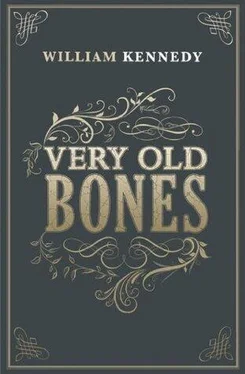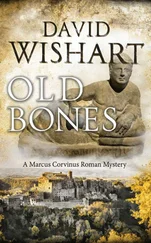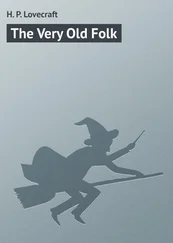“I’ll be a son of a bitch,” Peter said.
“Ya always have been,” the man said with a small smile.
Peter put the flowers aside and extended his hand. “Come on in,” he said, and the man came up the three steps, wiped the soles of his shoes on the doormat, and stepped inside, gripping Peter in a strong handshake. Peter closed the door, holding the man’s shoulder, and walked him down the hallway to the back parlor where Molly was giving a last-minute dusting to the furniture.
“Say hello to your brother, Moll,” Peter said, and she turned and looked and gaped and dropped the feather duster, and then ran four steps and threw her arms around the man and said “Fran,” and looked at him again and cried and kissed him and cried some more. “Fran, Fran. We thought you were dead.”
“Maybe I am,” Francis Phelan said.
He looked toward the front parlor and saw the corpse of his mother in her final silence. He stared at her.
“Go on in,” Molly said. “Go in and see her.”
“I’ll get to it,” Francis said, and he continued to stare.
“I’ll tell the others you’re here,” Molly said and she went toward the back stairs.
“How’d you find out?” Peter asked.
Francis broke his stare and looked at Peter. “I was in a lunchroom down in Hudson. Been stayin’ down there all fall, pickin’ apples, fixin’ up trucks for the owner, and this fella next to me gets up and leaves the Albany newspaper. I never do read a damn newspaper, but I pick this one up and turn the page and there’s the obit. I look at it and I figure right off this fella left that paper so’s I could see that, and I say to myself, Francis; maybe it’s time to go back and see people, and I took the next train that come by.”
Francis turned back toward the coffin and Peter read the look on his face: The bitch is dead. . lower away. Francis’s honesty in the teeth of unpleasant truth was galling to Peter; always had been. Hypocrisy is a sometime virtue, but then again fraudulence can stifle, even smother. Hadn’t Peter’s stifling of his own anger cost him years of bondage to this woman, this house?
“What’s goin’ through your head?” Peter asked.
“I was just thinkin’ how much she missed by bein’ the way she was,” Francis said. “She didn’t really know nothin’ about how to live.”
“Of course you’re the expert on that,” Peter said. “You’re a walking example.”
Francis nodded, looked down at his ragged attire, his shoes with even the uppers falling apart.
“Ain’t sayin’ I ever figured out how it was done, but I still know more’n she did. I got nothin’ against her anymore. She done what she hadda do all her life, and somethin’ gotta be said for that. I just never bought it, and neither did you.”
“Things got better when I moved to New York,” Peter said.
“That’s what I mean,” Francis said. He looked again at his mother, nodded once, that’s that, then turned his back to her.
Molly came in carrying two of the six flower baskets from the front hall. She set them on the floor near the head of the coffin.
“Everybody’ll be right down,” Molly said.
“Who’s everybody?” said Francis.
“Sarah and Tommy and Chick. They’re all home. Tommy’s a bit confused.”
“That figures,” said Francis.
Francis saw me edge into the room and sit in an empty chair. “Who’s the kid?” he asked.
“That’s the boy,” said Peter. “I mean the son of my landlady. Orson, say hello to a brother of mine, Francis.”
“How do you do, sir,” I said.
“I don’t know how I do sometimes, kid. Nice t’ meet ya.” And Francis shook my hand. He looked at his own hands then. “Can I wash up a bit?” he said, and he rubbed his palms together. “Kitchen’d be fine. Still where it used to be?”
“Go upstairs, use the bathroom,” Molly said.
“No need,” said Francis, and he moved to the kitchen, shoved his coat sleeves upward and soaped his hands with a bar of tan common soap. Molly watched him from the kitchen doorway, handed him a towel.
“Have you had lunch?” she asked.
“ ’bout a week ago,” Francis said.
“I’ll set the table,” she said. “There’s cold chicken, and Sarah’s biscuits.”
“Sounds mighty good,” Francis said.
He walked to the dining room to take his old place, his back to the famous china closet, facing the window on the yard where Katrina’s house had stood before it burned. Now only tall brown stickweeds inhabited the vacant lot where the house had been.
“You’re limping,” Molly said.
“Bumped my leg a few days ago, but it’s gettin’ better.”
“Let me look at it.”
“Nah, it’s fine. Nothin’ to see, just a black-and-blue mark.”
But the leg was more than black and blue. It was a massive infection whose pain had grown, subsided, grown again. Francis had bathed and bandaged it when he could, but the last bandage had come off during his climb onto the train up from Hudson, and he threw the soiled cloth out the freight-car door after he’d settled in. The wound was a legacy from being hit with a club by a flophouse bouncer, and what seemed like a trivial gash turned into an ulceration six inches in length with a purplish center, a gouge from which pus oozed, scaly white skin flaked and peeled, and flesh vanished. Francis now saw the wound as an insurance policy against life. When times got worse, as they seemed to be doing, he would cultivate the pus, the pain, the purplish-white crust of poison. What’s a little pain when it leads to the significant exit?
He heard steps on the back stairs, turned to see the feet of his brother Tommy, unmistakable canal boats in soiled white work socks, and behind him brother Chick, wearing galluses on a collarless shirt, a mile-wide smile on his face as he ogled Francis from midstairs.
“Hey, you old bastard,” Chick said. “How you doin’?” Chick came down the final two steps, pushed Tommy aside, grabbed Francis’s hand, threw an arm around his shoulder, slapped his back. “You old bastard,” Chick said. “Where you been?”
“How you, old Chickie pie? You’re fat as a pregged-up porker.”
“I can’t believe this, Francis, I can’t believe it. We give up on you years ago. Never thought I’d see your mug in this house again.”
“I thought the same thing.”
“Franny? Franny?” Tommy stood at Francis’s elbow, squinting, focusing. “Franny?”
“Tommy. Howsa boy? Eh? Howsa boy, old Tom-Tom?”
“Franny?”
“It’s me, Tom. It’s me. You remember me?”
“Sure I remember, Franny. How’s things, Franny?”
“Things is like they are, Tom boy.” Francis stood and wrapped his arms around Tommy’s shoulders, then kissed him on the cheek. “You old horse’s ass.”
Tommy smiled.
“Horse’s ass. Franny. You shouldn’t call me a horse’s ass.”
“Why not?” Francis said. “Where’d a horse be without his ass? Think about it.”
“Horse’s ass,” said Tommy in a whisper to Molly “Franny called me a horse’s ass.”
Francis parted Tommy’s right cheek and the room glowed with laughter, and the generosity of abuse.
Peter Phelan looked at his brother and saw himself as he wished he’d been but could never be. He saw a man who pursued his own direction freely, even if it led to the gutter and the grave. Francis was a wreck of a man, a lost soul on a dead-end street, yet in him was no deference to the awful finality of his condition. He did not seem to notice it. Nor did he defer to anything else, not the dead mother, or the need to spruce up for the family, or Tommy’s softness. And not Peter. Especially not Peter.
“So what’s with you, Fran?” Chick asked. “You gonna hang around or are you gonna disappear again?”
Читать дальше












